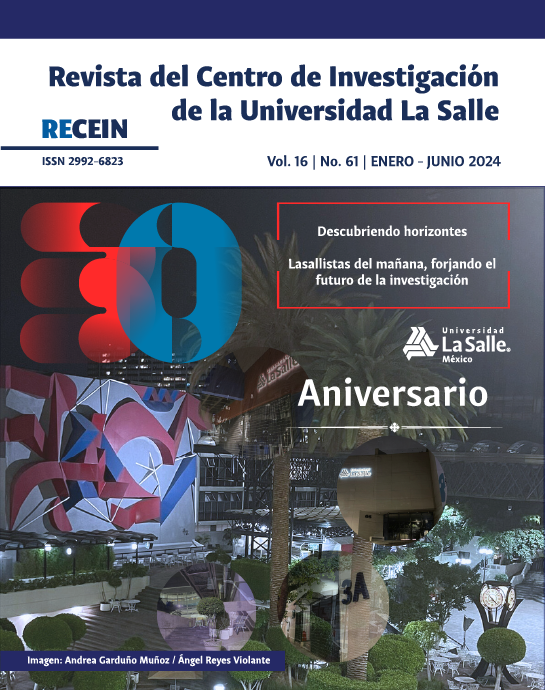Sesgos de comportamiento en la toma de decisiones financieras en estudiantes: un estudio comparativo México, Colombia y Chile1161
Contenido principal del artículo
Resumen
El estudio de la toma de decisiones sobre los recursos es un tema cada vez más relevante. Su desarrollo, ha llegado a abarcar variables de tipo psicológico y sociológico, con el fin de complementar el enfoque de análisis tradicional y así comprender el comportamiento de los individuos en términos económicos y financieros. Esto, ha permitido identificar sesgos de comportamiento, los cuales generan cierta influencia al momento de tomar decisiones, afectando la racionalidad de los individuos y generando un impacto sobre estos. Lo anterior, afecta en mayor medida a poblaciones consideradas vulnerables, destacando dentro de ellas a los estudiantes universitarios. Es por ello que, la presente investigación, tiene por objetivo analizar la incidencia de sesgos de comportamiento en el proceso de toma de decisiones de estudiantes universitarios de Chile, Colombia y México. Para esto, se empleó una metodología de tipo cualitativo, conformando una herramienta de recopilación de información compuesta por preguntas con escala dicotómica y tipo Likert para la evaluación de ocho sesgos de comportamiento en los estudiantes universitarios. La información recopilada fue analizada utilizando software estadístico especializado, aplicando pruebas de correlación y análisis de varianza, identificando la existencia de numerosos sesgos en la toma de decisiones de los estudiantes universitarios. A partir de ello, se concluye que es necesaria una formación más específica acerca de la gestión de recursos, como parte del proceso de formación universitaria.
Descargas
Detalles del artículo

Esta obra está bajo una licencia internacional Creative Commons Atribución-NoComercial-CompartirIgual 4.0.
Esta revista se encuentra bajo la licencia de Creative Commons, por tanto, los autores, al postular su artículo, lo adhieren a dicha licencia.El autor puede disponer de su artículo para su archivo en repositorios institucionales o en páginas web personales, con la referencia y agradecimientos a la fuente donde se ha publicado.
Citas
Abinzano, I., Muga, L., & Santamaría, R. (2010). The role of over-reaction and the disposition effect in explaining momentum in Latin American emerging markets. Investigación Económica, 69(273), 151–186. https://bit.ly/3J4bS16
Abukari, K., Oldford, E., & Willcott, N. (2021). Student-managed investment funds: a review and research agenda. Managerial Finance, 47(11), 1608–1635. https://doi.org/10.1108/MF-02-2021-0080
Akben-Selcuk, E. (2015). Factors Influencing College Students’ Financial Behaviors in Turkey: Evidence from a National Survey. International Journal of Economics and Finance, 7(6). https://doi.org/10.5539/ijef.v7n6p87
Atif Sattar, M., Toseef, M., & Fahad Sattar, M. (2020). Behavioral Finance Biases in Investment Decision Making. International Journal of Accounting, Finance and Risk Management, 5(2), 69-75. https://doi.org/10.11648/j.ijafrm.20200502.11
Bandeira, M., Bekou, V., Lott, K. S., Augusta, M., Sandra, T., & Rocha, S. (2002). Validação transcultural do Teste de Orientação da Vida (TOV-R). Estudos de Psicologia, 7(2), 251–258. https://doi.org/10.1590/S1413-294X2002000200006
Barberis, N., Shleifer, A., & Vishny, R. (1998). A model of investor sentiment. Journal of Financial Economics, 49(3), 307–343. https://doi.org/10.1016/S0304-405X(98)00027-0
Brav, A., & Heaton, J. B. (2002). Competing Theories of Financial Anomalies. The Review of Financial Studies, 15(2), 575–606. https://doi.org/10.1093/rfs/15.2.575
Chen, H., & Volpe, R. (1998). An analysis of personal financial literacy among college students. Zhongguo Jiguang/Chinese Journal of Lasers, 7(2), 107–128. https://doi.org/10.3788/CJL201643.0811001
Chouzouris, M., Xenos, P., & Tinios, P. (2022). Becoming ‘Homo Economicus’ as Learned Behavior among Numerate Greek University Students. Social Sciences, 11(5). https://doi.org/10.3390/socsci11050193
Engström, P., Nordblom, K., Ohlsson, H., & Persson, A. (2015). Tax Compliance and Loss Aversion. American Economic Journal: Economic Policy, 7(4), 132–164. https://doi.org/10.1257/pol.20130134
Fama, E. F. (1969). Efficient Capital Markets: A Review of Theory and Empirical Work. The Journal of Finance 25(2), 383-427. https://doi.org/10.2307/2325486
Frederick, S. (2005). Cognitive Reflection and Decision Making. Journal of Economic Perspectives, 19(4), 25-42. https://doi.org/10.1257/089533005775196732
Hirshleifer, D., Subrahmanyam, A., & Titman, S. (2006). Feedback and the success of irrational investors. Journal of Financial Economics, 81(2), 311–338. https://doi.org/https://doi.org/10.1016/j.jfineco.2005.05.006
Huber, L. R., Sloof, R., & van Praag, M. (2017). The effect of incentives on sustainable behavior: evidence from a field experiment. Labour Economics, 45, 92–106. https://doi.org/10.1016/j.labeco.2016.11.012
Konstantinidis, A. D., Konstantinos, S., Alexandros, G., & Haritaki, H. (2022). Cognitive/Emotional Errors and Financial Education. In N. Tsounis & A. Vlachvei (Eds.), Advances in Quantitative Economic Research (pp. 189–202). Springer International Publishing. https://doi.org/10.1007/978-3-030-98179-2_14
Kristjanpoller Rodríguez, W. (2011). Efecto día feriado en los principales mercados accionarios de Latinoamérica. Contaduría y Administración, 57(2), 45–62. https://bit.ly/3ZNfnz7
Liu, Z., Bai, L., & Li, Y. (2021a). The Exploration of the Teaching Effects of Behavioral Finance Course Based on the PAD Platform. 2021 2nd International Conference on Information Science and Education (ICISE-IE), 1370–1373. https://doi.org/10.1109/ICISE-IE53922.2021.00307
Lucchesi, E. P., Yoshinaga, C. E., & de Castro Junior, F. H. F. (2015). Disposition effect among brazilian equity fund managers. RAE Revista de Administracao de Empresas, 55(1), 26–37. https://doi.org/10.1590/S0034-759020150104
Lumpkin, J. R. (1985). Validity of a Brief Locus of Control Scale for Survey Research. Psychological Reports, 57(2), 655–659. https://doi.org/10.2466/pr0.1985.57.2.655
Martin, L., Aronow, P., Baldwin, K., Ballard-Rosa, C., Blattman, C., Debs, A., Dickson, E., Grossman, G., Huber, G., Humphreys, M., Laitin, D., Posner, D., Raffler, P., Rose-Ackerman, S., Samii, C., Scheve, K., Stokes, S., & Weinstein, J. (2016). Taxation, Loss Aversion, and Accountability: Theory and Experimental Evidence for Taxation’s Effect on Citizen Behavior. https://bit.ly/3QYernp
Mewse, A. J., Lea, S. E. G., & Wrapson, W. (2010). First steps out of debt: Attitudes and social identity as predictors of contact by debtors with creditors. Journal of Economic Psychology, 31(6), 1021–1034. https://doi.org/10.1016/j.joep.2010.08.009
Moy, R. L., & Pactwa, T. E. (2022). Using Mind Over Money to introduce topics in behavioral economics and finance. Journal of Education for Business, 97(6), 401–408. https://doi.org/10.1080/08832323.2021.1966606
OCDE. (2005). Improving Financial Literacy. OECD. https://doi.org/10.1787/9789264012578-en
Pearson, K. (1900). X. On the criterion that a given system of deviations from the probable in the case of a correlated system of variables is such that it can be reasonably supposed to have arisen from random sampling. The London, Edinburgh, and Dublin Philosophical Magazine and Journal of Science, 50(302), 157–175. https://doi.org/10.1080/14786440009463897
Pérez-Martínez, A., & Rodríguez-Fernández, A. (2022). Behavioral Economics: its influence on the prediction of sports results. Retos, 12(23), 125–138. https://doi.org/10.17163/ret.n23.2022.08
Plata-Gómez, K. R., & Caballero-Márquez, J. A. (2020). Influencia de los programas de educación financiera sobre el comportamiento de los jóvenes: una revisión de literatura. I+D Revista de Investigaciones, 15(2), 16–24.
Prakash, N., & Alagarsamy, S. (2022). Does Gender and Family Income Impact Stock Trading of B-School Students? Findings from a Stock Simulation Exercise. Vision, 26(4), 454–460. https://doi.org/10.1177/0972262921992591
Rogers, P., Rogers, D., & Securato, J. R. (2015). About psychological variables in application scoring models. RAE Revista de Administracao de Empresas, 55(1), 38–49. https://doi.org/10.1590/S0034-759020150105
Schindler, M. (2007). Rumors in financial markets: Insights into behavioral finance. John Wiley & Sons.
Schwarzer, C., & Jerusalem, R. (1995). Generalized Self-Efficacy scale. https://bit.ly/3H1wapc
Shiller, R. J. (2013). Finance Contributing to the Good Society. Business Economics, 48(1), 77–80. https://doi.org/10.1057/be.2012.31
Thaler, R., & Mullainathan, S. (2000). Behavioral economics. Nber Working Paper Series, 7948, 1–13. https://doi.org/10.3386/w7948
Thomas, L. C., Thomas, S., Tang, L., & Ap Gwilym, O. (2005). Impact of demographic and economic variables on financial policy purchase timing decisions. Journal of the Operational Research Society, 56(9), 1051–1062. https://doi.org/10.1057/palgrave.jors.2601981
 English
English


